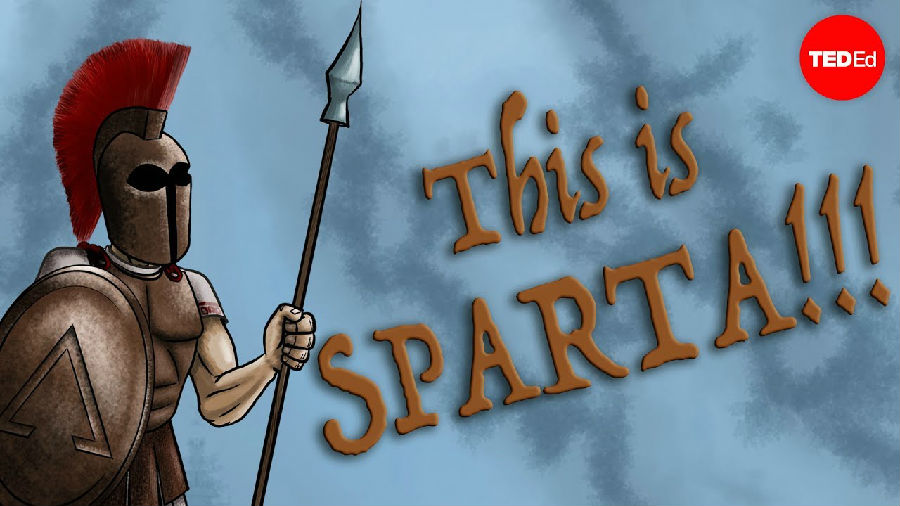(单词翻译:单击)
In ancient Greece, violent internal conflict between bordering neighbors and war with foreign invaders was a way of life,
在古希腊,邻国之间暴力的内部冲突和与外侵者的战争是家常便饭,
and Greeks were considered premier warriors.
而希腊人被看作是顶尖的战士。
Most Greek city-states surrounded themselves with massive defensive walls for added protection.
大多数希腊城邦在边界筑起严实的城墙作为附加的保护措施。
Sparta in its prime was a different story,
最健壮的斯巴达勇士则是另一回事,
finding walls unnecessary when it had an army of the most feared warriors in the ancient world.
在古代,当有一只令人恐惧的军队时,城墙便没有了必要性。
So what was Sparta doing differently than everyone else to produce such fierce soldiers?
那么斯巴达是用什么独特的方式来训练如此矫勇善战的士兵的呢?
To answer that question, we turn to the written accounts of that time.
我们可以从当时的文献中寻找答案来解答这个问题。
There are no surviving written accounts from Spartans themselves, as it was forbidden for Spartans to keep records,
斯巴达人没有任何书写的文献留存,因为保留记录是被斯巴达人禁止的,
so we have to rely on those of non-Spartan ancient historians, like Herodotus, Thucydides, and Plutarch.
所以我们只能依靠非斯巴达的古代历史学家的记录,比如希罗多德,修昔底德和普鲁塔克。
These stories may be embellished and depict Sparta at the apex of its power, so take them with a grain of salt.
这些故事或许被润色过,描述的是斯巴达在战争中的顶峰状态,所以我们对这些故事持保留态度。
For Spartans, the purpose for their existence was simple: to serve Sparta.
对一斯巴达人来说,他们的存在目的非常简单:即服务于斯巴达。
On the day of their birth, elder Spartan leaders examined every newborn.
在他们出生的那天,年长的斯巴达领导会测试每一个新生儿。
The strong healthy babies were considered capable of fulfilling this purpose,
强壮健康的宝宝会被认为可以训练成斯巴达勇士来保卫城邦,
and the others may have been left on Mount Taygetus to die.
其他的可能会被遗弃在塔吉图斯山上等死。
Every Spartan, boy or girl, was expected to be physically strong, mentally sharp, and emotionally resilient.
每一个斯巴达人,无论男女,都被期望拥有强健的身躯、敏锐的头脑和极强的韧性。
And it was their absolute duty to defend and promote Sparta at all costs.
不论付出多大的代价,他们的唯一义务就是保卫和扩大斯巴达。
So in the first years of their lives,
在他们的幼年,
children were raised to understand that their loyalty belonged first to Sparta, and then to family.
孩子就开始被要求理解他们首先需忠于斯巴达,其次忠于家庭。

This mindset probably made it easier for the Spartan boys,
这种认知也许让斯巴达男孩更容易地理解他们的未来,
who upon turning seven, were sent to the agoge, a place with one main purpose:
满七岁的男孩要被送到“斯巴达教育营”,为了一个目的:
to turn a boy into a Spartan warrior through thirteen years of relentless, harsh, and often brutal training.
通过十三年不休的、艰苦的、甚至残酷的训练,将他们变成一个斯巴达勇士。
The Spartans prized physical perfection above all else,
斯巴达人最嘉奖体能的强健,
and so the students spent a great deal of their time learning how to fight.
所以学生们用大多时间来学习如何战斗。
To ensure resilience in battle, boys were encouraged to fight among themselves, and bullying, unlike today, was acceptable.
为了确保他们在一场战斗中持久性,男孩们被鼓励打架,而与今天不同,欺凌是被接受的。
In order to better prepare the boys for the conditions of war, the boys were poorly fed, sometimes even going days without eating.
为了更好地让这些男孩提前适应战场上的情况,给这些男孩的伙食都非常差,有时很多天都不进食。
They also were given little in the way of clothing so that they could learn to deal with different temperatures.
他们常常衣衫褴褛,为的是让他们去适应不同的温度。
Spartan boys were encouraged to steal in order to survive, but if they were caught, they would be disciplined,
斯巴达男孩常常被鼓励“为了生存,可以偷窃”,但是如果他们被抓了现行,就会被惩罚;
not because they stole, but because they were caught in the act.
惩罚的并非偷窃本身,而是偷窃被人逮到。
During the annual contest of endurance in a religious ritual known as the diamastigosis,
在一场名为“惩戒赛”的一年一度的宗教性忍耐力比赛里,
teenage boys were whipped in front of an altar at the Sanctuary of Artemis Orthia.
青少年男孩们会在阿尔忒弥斯神庙中的圣坛上被鞭挞。
It was common for boys to die on the altar of the goddess.
男孩们在圣坛中被鞭挞致死是很常见的事。
Fortunately, not everything was as brutal as that.
幸运的是,还有一些不那么残忍的事。
Young Spartans were also taught how to read, write, and dance,
年轻的斯巴达人也会学习阅读、写作、舞蹈,
which taught them graceful control of their movements and helped them in combat.
这些都会教会他们优雅地控制动作,帮助他们更好的战斗。
While the responsibilities for the girls of Sparta were different,
虽然斯巴达女孩肩负的责任有所不同,
the high standards of excellence and expectation to serve Sparta with their lives remained the same.
高标准、严要求和一生奉献给斯巴达城的目标是不变的。
Spartan girls lived at home with their mothers as they attended school.
斯巴达女孩上学时与母亲住在家里。
Their curriculum included the arts, music, dance, reading, and writing.
她们的课程包括艺术、音乐、舞蹈、阅读和写作。
And to stay in peak physical condition, they learned a variety of sports, such as discus, javelin, and horseback riding.
为了使身体一直处于巅峰状态,她们学习一系列运动,比如说铁饼、标枪与马术。
In Sparta, it was believed that only strong and capable women could bear children that would one day become strong and capable warriors.
在斯巴达,人们相信只有强壮和有能力的女人,才能孕育出可以成为强壮厉害的士兵的孩子。
To all Spartans, men and women, perhaps the most important lesson from Spartan school was allegiance to Sparta.
对于所有的斯巴达人来说,无论男女,学校里教的最重要的一课便是对斯巴达的忠诚。
To die for their city-state was seen as the completion of one's duty to Sparta.
为城邦而亡被看做完成斯巴达人人生的一项重要责任。
Upon their death, only men who died in battle and women who died in childbirth were given tombstones.
他们死后,只有在战场上牺牲的烈士和难产的母亲可以有墓碑。
In the eyes of their countrymen, both died so that Sparta could live.
因为在人们眼中,他们的牺牲都是为了斯巴达的长盛。


